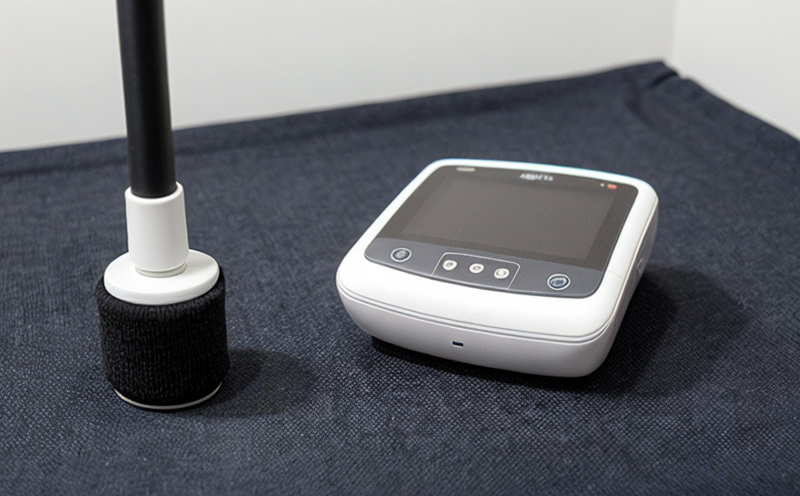Evaluation of antenna performance in RF functional textiles
The evaluation of antenna performance in radio frequency (RF) functional textiles is a critical service that ensures textiles meet stringent requirements for signal transmission and reception. This service is particularly important in sectors such as aerospace, defense, automotive, and consumer electronics where the integration of antennas into textile structures enhances functionality and performance.
Our state-of-the-art laboratory specializes in evaluating antenna performance within RF functional textiles using advanced testing methods that simulate real-world conditions. We employ rigorous standards like ISO 17864 for electromagnetic compatibility (EMC) testing, ensuring our results are reliable and internationally recognized.
The evaluation process begins with thorough specimen preparation, where we ensure the integrity of the textile structure while integrating the antenna. This involves selecting appropriate materials that support high-frequency signals without introducing significant losses or distortions. Our experienced engineers then use specialized equipment to measure key parameters such as gain, efficiency, and bandwidth of the antenna.
One of the challenges in this field is ensuring that the antenna maintains its performance characteristics under dynamic conditions. We address this by subjecting the textile samples to various environmental stress tests including temperature cycling, moisture exposure, and mechanical abrasion. These tests help us determine how well the textile holds up over time and in different environments.
The testing methodology also includes simulations of specific use cases, such as wearables or vehicle interiors, where antennas need to operate effectively despite constant movement and potential interference from other electronic devices. Our comprehensive approach ensures that we not only meet current standards but also anticipate future regulatory requirements.
| Environmental Stress Test | Description |
|---|---|
| Temperature Cycling | Simulates extreme temperature changes that the textile may encounter in different climates and operating conditions. |
| Moisture Exposure | Evaluates the durability of the antenna under humid environments, which can affect signal integrity. |
| Mechanical Abrasion | Tests the robustness of the textile structure against wear and tear from regular use. |
Our team provides detailed reports that include not only quantitative data but also qualitative insights into the performance characteristics of the antenna within the textile. These reports are invaluable for quality managers, compliance officers, R&D engineers, and procurement teams looking to ensure their products meet high standards.
Scope and Methodology
The scope of our evaluation service includes a detailed examination of the antenna performance within RF functional textiles. This involves not only the physical integration but also the electrical characteristics that ensure optimal operation. The methodology we follow is designed to be comprehensive yet precise, ensuring accurate and repeatable results.
- Thorough specimen preparation using appropriate materials
- Specialized equipment for measuring gain, efficiency, and bandwidth
- Environmental stress tests including temperature cycling, moisture exposure, and mechanical abrasion
- Simulations of real-world use cases to evaluate performance under dynamic conditions
We adhere strictly to international standards such as ISO 17864 for EMC testing, which guarantees the accuracy and reliability of our results. Our methodology is further supported by advanced analytical tools that provide detailed insights into the behavior of antennas within textile structures.
Industry Applications
| Industry Segment | Description |
|---|---|
| Aerospace & Defense | Enhanced communication systems in wearable devices and aircraft interiors. |
| Automotive | Integration of antennas into seat fabrics for improved infotainment systems. |
| Consumer Electronics | Better connectivity through smart textiles used in wearables like fitness trackers. |
| Medical Devices | Improved signal transmission in textile-based patient monitoring devices. |
In each of these industries, the evaluation of antenna performance within RF functional textiles plays a crucial role. By ensuring that antennas function optimally within these textiles, we enable innovations that enhance user experience and operational efficiency.
Why Choose This Test?
- Comprehensive evaluation of antenna performance under various environmental conditions.
- Use of advanced instrumentation for precise measurement of key parameters.
- Adherence to international standards ensuring reliability and accuracy.
- Detailed reports providing both quantitative data and qualitative insights.
- Expertise in specimen preparation to maintain textile integrity during integration.
- Simulations of real-world use cases to ensure robust performance across different environments.
- Support for regulatory compliance with current and future standards.
By choosing our evaluation service, you gain access to a team of experts who are dedicated to delivering high-quality, reliable results. Our commitment to excellence ensures that your products meet the highest standards in their respective industries.





